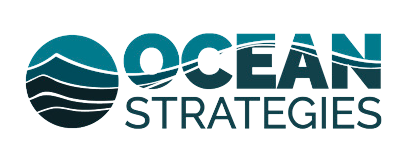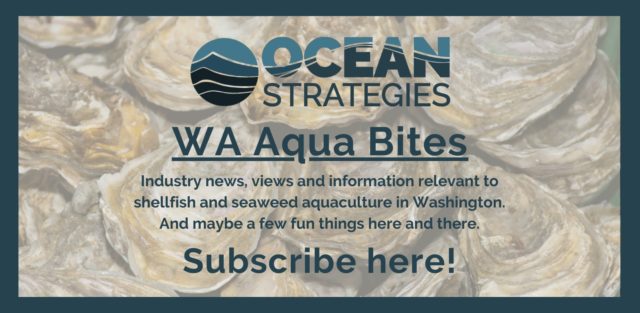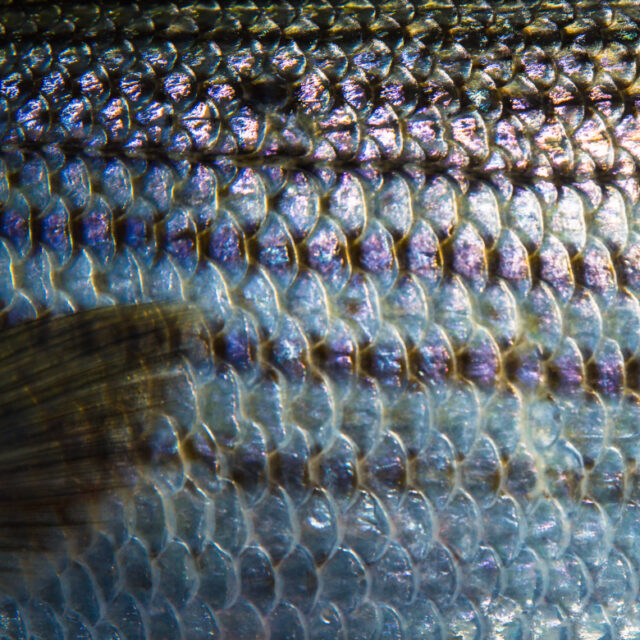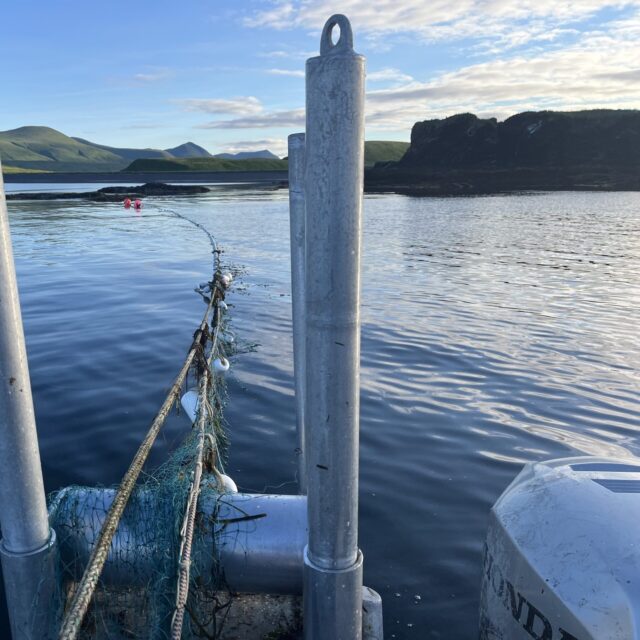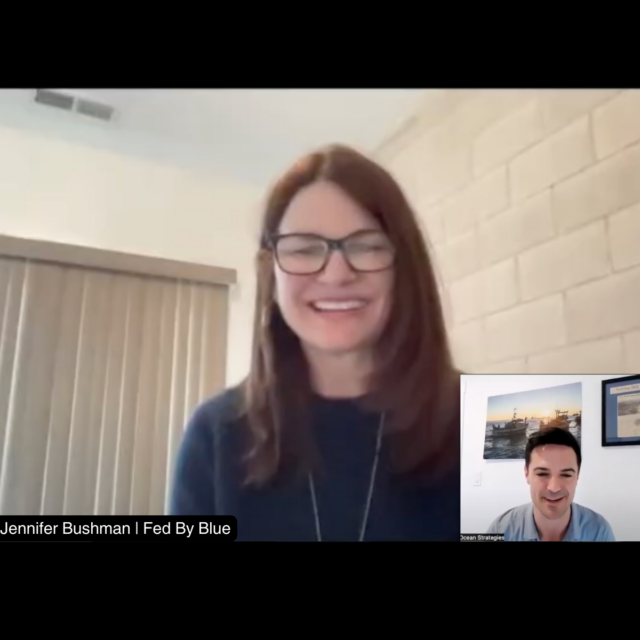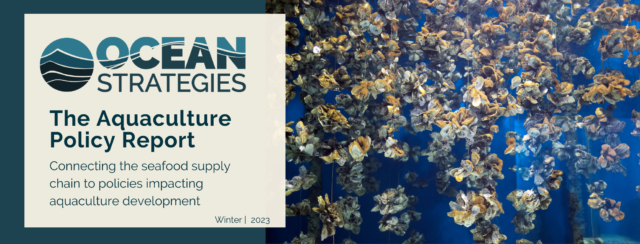
The Aquaculture Policy Report provides timely policy and industry updates connecting sectors across the seafood supply chain to aquaculture policy development. Sign up here.
America’s policy makers and industry experts are charting a course for the future of U.S. aquaculture, and we’re here to help track what affects you and your business. Supply chains and seafood communities nationwide have a stake in where and how aquaculture development happens and how we set standards and priorities. Keep reading for spotlights and opportunities.
VIEWS FROM THE BIG ISLAND
Deep Dives and Long Runways to Community-Based Aquaculture
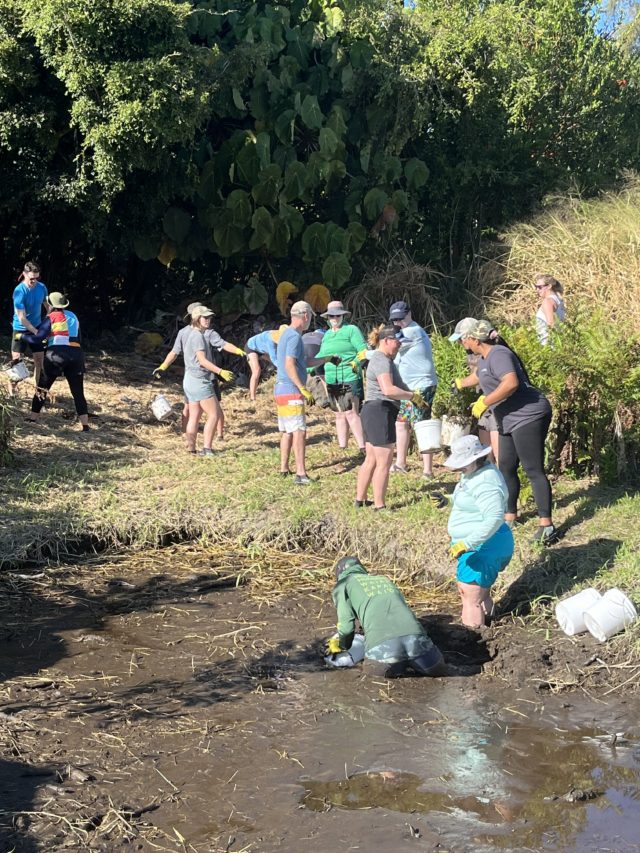 As cultural norms and policies change, it’s important to be at the table to represent fishing community voices with educated positions on the many forms of aquaculture. We didn’t see anyone else tracking and reporting on these topics specifically for a commercial fishing audience. We sought to fill that gap. Our quarterly Aquaculture Policy Reports synthesize regional and national updates on policy so fishermen and fisheries leaders can track what’s happening, what’s important, and have access to educational tools to stay up to speed.
As cultural norms and policies change, it’s important to be at the table to represent fishing community voices with educated positions on the many forms of aquaculture. We didn’t see anyone else tracking and reporting on these topics specifically for a commercial fishing audience. We sought to fill that gap. Our quarterly Aquaculture Policy Reports synthesize regional and national updates on policy so fishermen and fisheries leaders can track what’s happening, what’s important, and have access to educational tools to stay up to speed.ENHANCING DIVERSITY, EQUITY & INCLUSION IN THE SEAFOOD INDUSTRY
As we close out Black History Month and begin National Women’s History Month, we’d like to recognize a few organizations working to elevate diverse representation in the seafood industry
Minorities in Aquaculture
Minorities in Aquaculture (MIA), is an organization working to educate minority women about the environmental benefits provided by local and global aquaculture in order to promote a more diverse, inclusive aquaculture industry.
Check out this Q&A with Imani Black, founder and CEO of MIA, and National Fisherman’s Megan Waldrep: Redefining ‘Minority’ with Imani Black of Minorities in Aquaculture
Follow MIA on Instagram: @mia_npo
Seafood and Gender Equality
Seafood and Gender Equality (SAGE) is an organization working to uplift, amplify, and integrate diverse voices in the global seafood sector in order to build a more resilient industry.
Check out The Conch Podcast, hosted by Julie Kuchepatov, founder of SAGE, and stay tuned for The Bloom, a new networking group and community for women and genderqueer people in the seafood industry, launching in 2023!
Follow SAGE on Instagram: @seafood_and_gender_equality
Meridian Institute Convenes DEI-Aquaculture Community of Practice
In an effort to tackle workforce development challenges in the aquaculture sector, the Meridian Institute is developing collaborations around diversity, equity, and inclusion (DEI) practices throughout the workforce pathway.
Building on the fundamental concept that a diverse workforce is a more successful and stable workforce, Meridian has convened a new aquaculture educator and practitioner collaborative, the DEI-Aquaculture Community of Practice (CoP). The CoP supports DEI best practices to build social and economic benefits that reinforce one another, and enhance the long-term social sustainability of U.S. aquaculture.
Since its first convening in summer 2022, the CoP has worked to position DEI as an integral pillar of workforce development. To achieve this, the group makes connections between DEI initiatives and workforce needs, socializes the importance of DEI with aquaculture stakeholders (including outlining DEI strategies), and supports students with opportunities to access work in the industry.
Check out Meridian’s report DEI Challenges and Opportunities in U.S. Aquaculture Workforce Development, authored by Ian Yue, Maia Hatchett, and Meghan Massaua.
Establishing diverse representation throughout the seafood industry is a vital component to ensure an environmentally, socially and economically sustainable supply chain.
Most importantly, diversity in leadership is a demonstrated strategy for creating a more resilient and thriving business and industry. Incorporating the skill and expertise of women and BIPOC into seafood industry leadership and decision-making positions, especially as it relates to discussions around climate and food policies, helps us to achieve a viable and thriving food system.
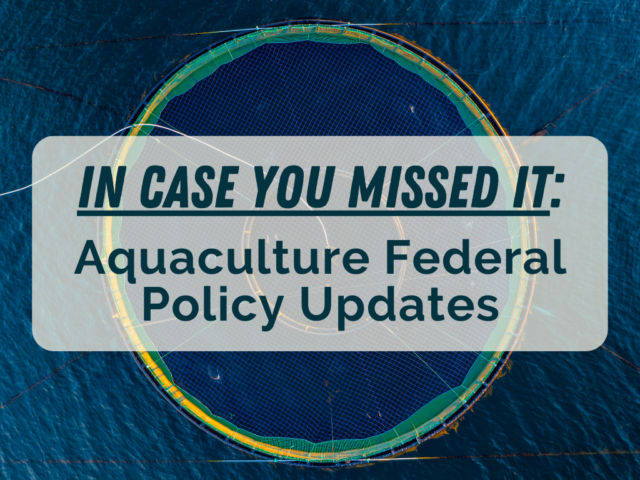
Reps. Huffman and Peltola make moves to support seaweed mariculture
New bill supports research, indigenous grant program, and education of coastal seaweed farming
U.S. Representatives Jared Huffman (D-California) and Mary Peltola (D-Alaska) have co-sponsored a new bill, the Coastal Seaweed Farm Act of 2023, which would advance the U.S. seaweed mariculture industry. U.S. Senator Edward J. Markey (D-Massachusetts) has sponsored the bill in the U.S. Senate.
Provisions within the Coastal Seaweed Farm Act:
- Directs NOAA and the USDA to produce a joint study to evaluate benefits and impacts of coastal seaweed farming, the results of which will be used to develop regulations and metrics to maximize benefits and avoid adverse impacts.
- Establish the Indigenous Seaweed Farming Fund, a grant program to reduce cost barriers for indigenous communities to get involved in coastal seaweed farming.
- Collaborate with the Interagency Working Group on Indigenous Traditional Ecological Knowledge, states, tribes, local governments and other federal agencies on best practices.
- Develop food safety regulations on farmed seaweed in coordination with the USDA
- Provide educational materials for the training of incoming coastal seaweed farmers, prioritizing indigenous communities.
Read more from Seafood Source and National Fisherman.
SEAfood Act introduced in the House
Bill focused on offshore aquaculture marks latest in flurry of aqua-focused federal policy
On December 8, Rep. Alan Lowenthal (D-CA) introduced the Science-based Equitable Aquaculture Food Act, or SEAfood Act. This bipartisan bill, co-sponsored by Reps. Julia Brownley (D-CA), Nancy Mace (R-SC), Chellie Pingree (D-ME), and Jimmy Panetta (D-CA), prioritizes data and science in support of a more equitable, inclusive, and sustainable offshore aquaculture industry.
The SEAfood Act would direct government agencies to produce scientific reports and assessments regarding the feasibility of offshore aquaculture development, as well as instate a grant program for aquaculture education and career development at institutions for traditionally underserved communities.
Key provisions in the SEAfood Act:
-
Government Accountability Office (GAO) study: Report highlighting lessons learned in aquaculture permitting, monitoring, and regulations since the last assessment (2008). This includes analyzing aquaculture’s impact on wild-capture fisheries and their markets.
-
National Academies of Sciences, Engineering, and Medicine study: Baseline scientific review of efficient and effective regulation for offshore aquaculture.
-
National Oceanic and Atmospheric Administration (NOAA) assessment program: Establishes an offshore aquaculture assessment program to gather data from on-the-water demonstration projects. Includes a state opt-out provision for offshore projects.
- NOAA grant program for minority-serving institutions: Creates a grant program for minority-serving institutions, historically Black colleges, and Tribal colleges to further develop aquaculture curricula and promote career development.
The introduction of the SEAfood Act followed the announcement of new cosponsors for the AQUAA Act in September 2022. This bill was reintroduced in 2021 and would establish a regulatory framework for U.S. offshore aquaculture.
WHAT’S NEXT for the SEAfood Act? With the start of a new congressional session, the SEAfood Act will need to be reintroduced in order to move forward.
Check out this op-ed published in The Hill, authored by Environmental Defense Fund senior scientist Rod Fujita, and California State University professor Michael Graham, discussing the SEAfood Act.
Update: Aquaculture Opportunity Areas
NOAA begins next step for aquaculture siting initiative
NOAA is on to the next phase of its effort to suss out areas for potential aquaculture development. The Aquaculture Program has shifted to assessing environmental impacts of the first two Aquaculture Opportunity Areas. The two pilot areas were deemed appropriate for developing offshore aquaculture resources, and are part of a formal process of in-depth environmental evaluation and public input around potential development.
In summer 2022, NOAA Fisheries announced Southern California and the Gulf of Mexico as targets for a Programmatic Environmental Impact Statement (PEIS). These announcements kicked off 60-day public scoping periods, and a series of virtual public meetings gathering input on each PEIS.
NMFS is currently reviewing all comments that were received and developing a public scoping summary.
The AOA initiative has maintained momentum between administrations, having begun with a Trump-era executive order in May 2020. Each step of this lengthy process incorporates a public comment period:
-
Within a year of the EO: Identify at least two geographic areas, in federal and/or state waters, suitable for commercial aquaculture. DONE.
-
Within two years of IDing those areas: Complete a National Environmental Policy Act PEIS for each area. IN PROGRESS (AOA Atlases for both areas)
-
In the following four years: Identify two additional areas each year and complete a PEIS for each within two years, for a total of at least 10 areas over the course of five years. STILL TO COME
So far, NOAA’s AOA initiative has received mostly broad support from diverse stakeholder groups as science-based and stakeholder driven. As the agency moves through the steps to expand aquaculture projects in domestic waters, stakeholder input throughout the supply chain will be critical to developing aquaculture investment that complements and expands our existing sustainable seafood chain, through environmentally and socially responsible development.
Bipartisan Aquaculture Caucus formed in the House
New House caucus working to advance U.S. aquaculture development
Update: In December 2022, a new congressional aquaculture caucus was formed with the primary goal of advancing U.S. aquaculture development through legislative initiatives. The House aquaculture caucus is comprised of 13 representatives, and co-chaired by Ed Case (D-Hawaii), Steven Palazzo (R-Mississippi), Jimmy Panetta (D-California), and Kat Cammack (R-Florida).
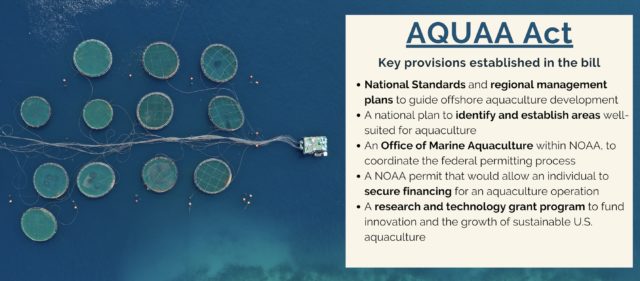
AQUAA Act reintroduction
Situational Summary: Congressional members took a third swipe toward comprehensive aquaculture policy in the last Congress. The Advancing the Quality and Understanding of American Aquaculture Act (AQUAA Act) is identical to its preceding iteration, and was reintroduced in the Senate in fall 2021 by Senators Roger Wicker (R-MS), Brian Schatz (D-HI), and Marco Rubio (R-FL). This bipartisan bill would establish regulations to advance aquaculture development in U.S. federal waters, and includes aquaculture siting, permitting, monitoring and enforcement.
Opponents remain concerned over offshore aquaculture’s sustainability impact on the marine environment as well as wild-capture fisheries. Commercial fishermen are calling for more analysis on impacts to seafood markets flooded with new product, as they were with farmed salmon’s introduction in the 80s and 90s. Alaska’s seafood industry and fisheries stakeholders, a seafood political juggernaut, are adamant about a state’s right to opt-out of federal aquaculture, which was not included in this recent bill.
Proponents of the bill applaud the regulations it has laid out, siting a lack of a comprehensive regulatory and permitting framework as a hindrance to responsible development. Supporters claim aquaculture development will reduce reliance on seafood imports, and bolster U.S. working waterfronts as well as food and manufacturing economies.
The AQUAA Act will need to be reintroduced this congressional session. With Republican control of the House, proponents of the bill are hopeful, but admit its passage will prove difficult.
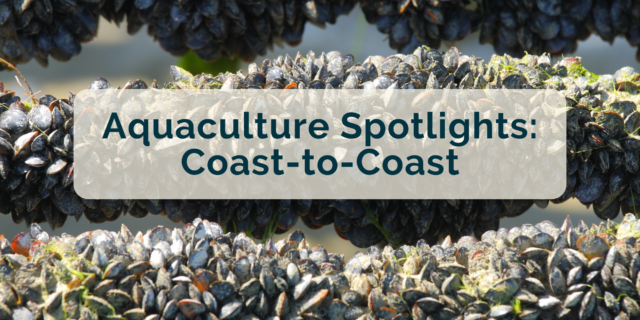
Alaska
New research shows environmental benefits of kelp farming
A new study from the University of Alaska Fairbanks has shown kelp provides ecological benefits by absorbing and processing ocean pollution or high concentrations of ocean elements. The study shows that specific species of kelp are especially effective at pulling nitrogen from the marine environment. Scientists worked with Alaskan kelp farmers to gather data for the project.
Alaska industry update: The Alaska Mariculture Cluster, a coalition managed by Southeast Conference, recently received major funding from the Build Back Better Regional Challenge (funded by the American Rescue Plan). The coalition was awarded a total of $49 million to help support Alaska’s growing mariculture industry.
Learn more about the Alaska Mariculture Cluster projects here.
Alaska Mariculture Alliance: A successor group to former Alaska Governor Bill Walker’s Alaska Mariculture Task Force (reauthorized in 2018 by Governor Mike Dunleavy), administered by the Alaska Fisheries Development Foundation. Its mission is to “develop and support a robust and sustainable mariculture industry, producing shellfish and aquatic plants for the long-term benefit of Alaska’s economy, environment and communities.”
Ocean Strategies is a proud associate member of the Alaska Mariculture Alliance.
New England
Maine’s scallop farming industry continues to thrive
Maine’s scallop farming industry has grown over the past 20 years, in part because of support from technologies learned from Japanese farmers. Tapping the expertise of these world leaders in scallop aquaculture, Maine’s farmers have advanced their own efforts.
Coastal Enterprises, Inc., for instance, has championed developmental projects supporting Maine’s fishing and aquaculture industries, offering opportunities for commercial fishermen to diversify their operations.
Part of this work has been managing farmers’ relationship with wild harvesters. CEI says that Maine’s scallop farming industry will not compete with wild scallop harvesting in New England. “A farmed scallop is not meant to compete or displace wild fishery scallops. It’s simply a different product offering,” says Hugh Cowperthwaite, CEI senior program director for fisheries and aquaculture.
Resources
- The Fish Site: Maine’s scallop industry is offering fishermen new opportunities at sea
- National Fisherman: Scallop aquaculture: technique from Japan ramps up Maine’s fishing industry
West Coast
Yellowtail farming operation proposed in Southern California waters
Pacific Ocean AquaFarms, a collaboration of Hubbs-SeaWorld Research Institute and Pacific6 Enterprises investment group, are proposing development of a yellowtail farming operation in federal waters off La Jolla, California. The farm has received opposition from local commercial fishing organization, San Diego Fishermen’s Working Group.
In Case You Missed It
Ocean Strategies releases newest WA Aqua Bites newsletter
The Ocean Strategies team has been keeping our ear to the ground regarding all things Washington aquaculture. Our quarterly newsletter, WA Aqua Bites, informs the seafood supply chain of important aquaculture happenings in Washington and beyond. Subscribe below.
EVENTS & OPPORTUNITIES
- March 2 – March 4:
- 2023 Maine Fishermen’s Forum (Rockport, ME)
- March 6 – March 7:
- 2023 Conference for Shellfish Growers (Union, WA)
- April 24-27:
- 2023 National Seaweed Symposium (Portland, ME)
- May 29 – June 1:
- World Aquaculture 2023 (Darwin, Australia)
